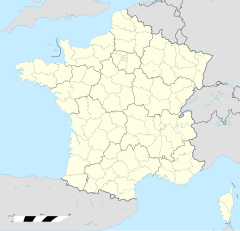Villa Cavrois
| Villa Cavrois | |
|---|---|

A panorama of Villa Cavrois
|
|
|
Location within France
|
|
| General information | |
| Type | ¨Private house |
| Architectural style | International style |
| Town or city | Croix |
| Country | France |
| Coordinates | 50°40′00″N 3°09′51″E / 50.666736°N 3.164053°ECoordinates: 50°40′00″N 3°09′51″E / 50.666736°N 3.164053°E |
| Construction started | 1929 |
| Completed | 1932 |
| Renovated | 2015 |
| Client | Paul Cavrois |
| Design and construction | |
| Architect | Robert Mallet-Stevens |
| Website | |
| www |
|
Villa Cavrois in Croix is a large modernist mansion built in 1932 by French architect Robert Mallet-Stevens for Paul Cavrois, an industrialist from Roubaix active in the textile industry.
Villa Cavrois is a testimony to the modernist vision of the 1920s as it was conceived by designers such as Le Corbusier, Pierre Chareau and the Bauhaus school. Luminosity, hygiene and comfort are the keywords that underlie such buildings. Villa Cavrois illustrates this concept with simplicity and elegance.
The large modern mansion was organized to offer the best possible lifestyle to the nine members of the family and to facilitate the daily work of the household staff. Its style was a total break from that of other neighbouring houses in the suburbs of Croix, even those of the same era. Clear guidelines governed the design of the building, which was commissioned in 1929: "air, light, work, sports, hygiene, comfort and efficiency".
Mallet-Stevens' work was not limited to the design of the building. he also designed the interior decoration and the gardens which surround the house. The layout of the villa was designed to ease movement and to organize in a rationale way day-to-day life in the building. Organised around the large entry hall which welcomes the visitors, the east wing is domain of the parents, while the west wing is devoted to the children and to the household staff. The entry hall gives access to the main rooms where the family gathered; the salon, the dining room and a smaller dining room for the children, linked to the garden by an external staircase.
The choice of materials and furniture inside echoed the hierarchy of space: everything was conceived and adapted for use in place. Simplicity and functionality of the furniture prevail in all parts. The luxury of this house does not lie in carved detailing or gilding, it unfolds in the richness of the materials used, such as unadorned marble, metal and wood.
The Villa Cavrois provided for its occupants a large number of amenities especially rare for the time, even in luxury houses. Use of the latest modern technology, especially electricity meant each room was provided with electric lighting, a radio loudspeaker, an electric clock and telephones enabled people to communicate between rooms or with the outside world. The house was provided with air conditioning, electric vacuum cleaning, and towel heaters. The water system provided hot and cold water, as well as softened water for cooking and drinking. Lighting was the subject of special care, in collaboration with engineer Solomon. The lighting, both direct and indirect, is very delicate and elegant.
...
Wikipedia

